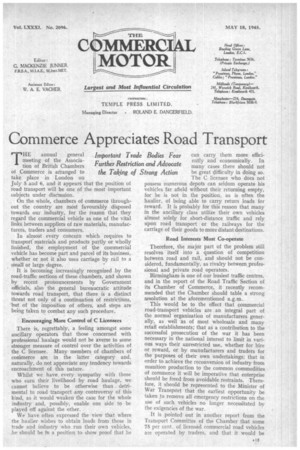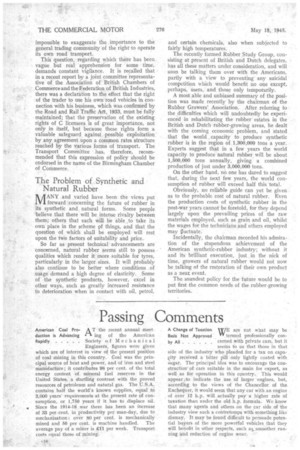Commerce Appreciates Road Transport
Page 17

Page 18

If you've noticed an error in this article please click here to report it so we can fix it.
THE annual general meeting of the Association of British Chambers of Commerce is arranged to take place in London on July 5 and 6, and it appears that the position of road transport will be one of the most important subjects under discussion.
• On the whole, chambers of commerce throughout the country are most favourably disposed towards our industry, for the reason that they regard the commercial vehicle as one of the vital links between suppliers of raw materials, manufacturers, traders and consumers.
In almost every concern which requires to transportmaterials and products partly or wholly finished, the employment of the commercial vehicle has become part and parcel of its business, whether or not it also uses carriage by rail to a small or large degree.
It is becoming increasingly recognized by the road-traffic sections of these chambers, and shown by recent pronouncements by Government officials, also the general bureaucratic attitude towards road transport, that there is a distinct threat not only of a continuation of restrictions, but of the imposition of others, and steps are being taken to combat any such procedure.
Encouraging More Control of C Licensees There is, regrettably, a feeling amongst some ancillary operators that those concerned with professional haulage would not be averse to some stronger measure of control over the activities of the C licensee. Many members of chambers of conimerce are in the latter category and, naturally, do not appreciate any tendency towards encroachment of this nature.
Whilst we have every 'sympathy with those who earn their livelihood by road haulage, we cannot believe to be otherwise than detrimental to road transport any controversy of this kind, as it would weaken the case for 'the whole industry and, possibly, enable one side to be played off against the other. We have often expressed the view that where the haulier wishes to obtain loads from those in trade and industry who run their own vehicles, he should be in a position to show proof that he can carry them more efficiently and economically. In many cases there should not be great difficulty in doing so. The C licensee who does not possess numerous depots can seldom operate his vehicles far afield without their returning empty, for he is not in the position, as is often the haulier, of being able to carry return loads for reward. It is probably for this reason that many in the ancillary class utilize their own vehicles almost solely, for short-distance traffic and rely upon road transport or the railways for the carriage of their goods to more distant destinations.
Road Interests Must Co-operate Therefore, the major part of the problem still resolves itself into a question of competition between road and rail, and should not be considered, fundamentally, as rivalry betweerkprofessional and private road operators.
Birmingham is one of our busiest traffic centres, and in the report of the Road Traffic Section of its Chamber of Commerce, it recently recommended that the Chamber should table a strong resolution at the aforementioned a.g.m.
This would be to the effect that commercial road-transport vehicles are an integral part of the normal organization of manufacturers generally, as well as of most wholesale and many retail establishments; that as a contribution to the successful prosecution of the war it has been necessary in the national interest to limit in various ways their unrestricted use, whether for hire or reward, or by manufacturers and traders for the purposes of their own undertakings; that in order to achieve the reconversion of industry from munition production to the common commodities of commerce it will be imperative that enterprise should be freed from avoidable restraints. Therefore, it should be represented to the Minister of War Transport that the earliest opportunity be taken to remove all emergency restrictions on the use of such vehicles no longer necessitated by the exigencies of the war.
It is pointed out in another report from the Transport Committee of the Chamber that some 75 per cent. of licensed commercial road vehicles are operated by traders, and that it would be impossible to exaggerate the importance to the general trading community of the right to operate its own road transport This question, regarding which there has been vague but real apprehension for some time, demands constant vigilance. It is recalled that in a recent report by a joint committee 'representative of the Association of British Chambers of Commerce and the Federation of British Industries, there was a declaration to the effect that the right of the trader to use his own road vehicles in connection with his business, which was confirmed by the Road and Rail Traffic Act, 1933, must be fully maintained; that the preservation of the existing rights of C licensees is of great importance, not only in itself, but because these rights form a valuable safeguard against possible exploitation by any agreement upon a common rates structure reached by the various forms of transport. The Transport Committee • has, therefore, recommended that this expression of policy should be endorsed in the name of the Birmingham Chamber of Commerce.•
The Problem of Synthetic and Natural Rubber
AANY and varied have been the views put IV I. forward concerning the future of rubber in its synthetic and natural forms. Some people believe that there will be intense rivalry between them; others that each will be able to take its own place in the scheme gf things, and that the question of which shall be employed will rest upon the two factors of suitability and price.
So far as present technical advancements are concerned, natural rubber seems still to possess qualities which render it more suitable for tyres, particularly in the larger sizes. It will probably • also continue to be better where conditions of usage demand a high degree of elasticity. Some of the synthetic products, however, excel in other ways, such as greatly increased resistance to deterioration when in contact with oil, petrol, and certain chemicals, also when subjected to fairly high temperatures.
The recently formed Rubber Study Group, consisting at present of British and Dutch delegates, has all these matters under consideration, and will soon be talking them over with the Americans, partly with a view to preventing any suicidal competition which would benefit no one except, perhaps, Users, and those only temporarily.
A most able and unbiased summary of the position was made recently by the chairman of the Rubber Growers'. Association. After referring to the difficulties which will undoubtedly be experienced in rehabilitating the rubber estate S in the British and Dutch rubber-growing areas, he dealt with the coming economic problem, and stated that the world capacity to produce synthetic rubber is in the• region of 1,300,000 tons a year. Experts suggest that in a few years the world capacity to produce natural rubber will be about 1,500,000 tons annually, giving a combined production of just under 3,000,000 tons.
On the other hand, ne one has dared to suggest that, during the next few years, the world consumption of rubber will exceed half this total.
Obviously, no reliable guide can yet be given as to the probable cost of natural rubber. Even the production costs of synthetic rubber in the post-war years cannot be foretold, for they depend largely upon the prevailing prices of the raw materials employed, such as grain and oil, whilst the wages for the technicians and others employed may guctuate.
Incidentally, the chairman recorded his admiration of the stupendous achievement of the American synthetic-rubber industry; without it and its brilliant execution, just in the nick of time, growers of natural rubber would not now be talking of the restoration of their own product as a near event. • The soundest policy for the future would be to put first the common needs of the rubber-growing territories.




















































